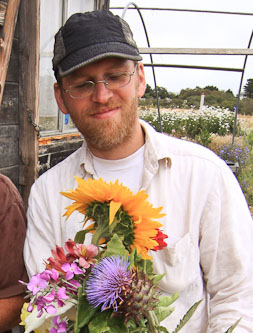Finding Hope in Urban Farming
Feb. 16, 2012

Eric Carlsen examines what's growing in our cities.
You wouldn’t think there were many farms within Chicago’s city limits; or that downtown Detroit would have acres of organic greens and fruit orchards, all within view of the GM Renaissance Building; or that cows soon might be grazing through the streets of New Orleans’ Lower Ninth Ward. But to Eric Carlsen, such fields thriving amid concrete and steel might just be the last best chance for saving our food system.
Carlsen, a junior in the CUNY Baccalaureate for Unique and Interdisciplinary Studies at Brooklyn College, was among the first eight recipients of the Rosen Fellowship — a program envisioned and funded by alumna Florence Rosen ’59. The program supports projects initiated by students to advance their academic and professional goals.
Carlsen proposed looking at ways to reverse the dissolution of the American food culture that first took hold in the late 19th century and gained momentum through much of the 20th. Culinary historians, such as Michael Pollen and Mark Kurlanski, have pointed to how American food practices have resulted in our country having one of the highest rates of infant mortality among developed countries, as well as an alarming escalation of diabetes due to the increasing prevalence of high fructose, starches and over-processed grains in our diet. Carlsen wanted to investigate how we may reimagine our food system, especially for inner-city residents who often do not have access to good markets or any viable alternatives to fast or highly processed food. His plan was to explore the “localvore” movement in which local markets are stocked with the freshest, most nutritious produce and meat because they originate within a radius of 150 miles. As Carlsen revealed in his proposal for the Rosen Fellowship: “A localized and cooperative food economy is the best opportunity we have for creating a sustainable, just and secure food system.”
He left Brooklyn last summer, intending to avoid the rich agricultural belt in the middle of the United States. Instead, Carlsen kept to the perimeter of the country and headed for the cities where he hoped to find abandoned lots transformed into working farms.
Over the next two months and traveling 10,000 miles, Carlsen discovered that urban farming rarely fits a pattern. Instead, it depends on the nature of the locality and its history. In New Orleans, for example, residents took advantage of the path Hurricane Katrina cut across the city in 2005, clearing away whole neighborhoods and leaving behind wide-open, grassy fields where houses once stood. Out of such devastation, Our School at Blair Grocery (OSBG) was formed. While clearing and tilling the land, the farm’s main focus was to foster youth education programs centered around food justice. But within a few years, the farm was also growing enough fruits and vegetables to share with neighbors, sell at local farmers markets, and supply local restaurants. In Detroit, the crumbling urban blight of abandoned and burnt houses on the city’s lower east side, the result of the city’s decades-long economic decline and political upheaval, gave rise to more than 800 community gardens and urban farms that also offer jobs for a neighborhood suffering through chronic underemployment, especially among the young.
“A few of the great projects that I found were able to give jobs to teenagers and folks who are homeless, such as OSBG in New Orleans and the Homeless Gardens in Santa Cruz, California,” Carlsen remarked. “They find the work therapeutic and empowering, and it gives them the funds and skills to really improve their lives.”
Carlsen’s original intent was to visit nine farms and to spend time working alongside the farmers. He also wanted to talk to activists, organizers and community members to get a better understanding of best practices and the effect farms have had on local residents and urban development. Carlsen’s journey led him to a deeper truth about his subject. Nothing, especially this project, would be as simple as thrusting a shovel into the ground and sowing some seeds.
While some of his plans remained unrealized, Carlsen came back with notebooks full of additional material, enough for several academic papers and a series of follow-up interviews with other urban farms. Trips to farms in the surrounding boroughs of New York, as well as Baltimore, Boston, Philadelphia and Pittsburgh, are now on his agenda.
And then there’s the project he wants to launch soon in Sunset Park’s Industry City. Where other people might see rutted cobblestone streets, old rail ties and walls of abandoned factory buildings under the shadows of the Brooklyn-Queens Expressway, where nature is in the form of the East River washing over the nearby pylons and vegetation is represented in the weeds and native grasses pushing through any crevice they can find, Eric Carlsen sees tomatoes, corn, collard greens and brussels sprouts — growing communities providing enough food for the surrounding neighborhood.
Most important, he sees hope.
“I hope that urban farming will play its part in changing our food system,” he said. “It’s too early to tell right now if that will happen. But there are many good and dedicated people across the country, and here in our city, who are doing great things. Right now it feels real.”

































